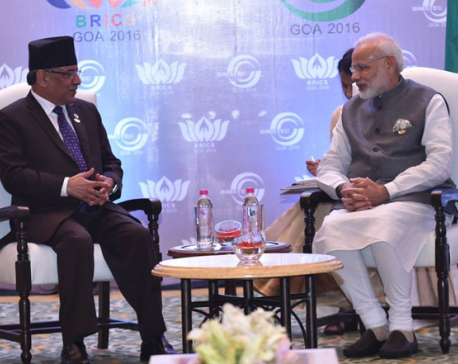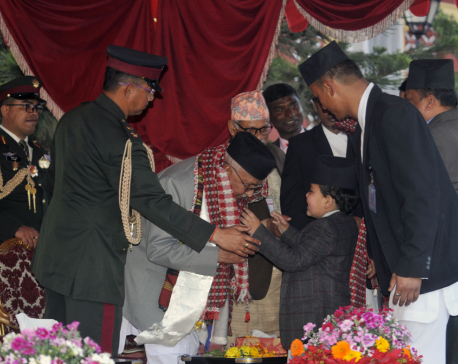
OR
PM, WB country director discuss priorities
Published On: September 22, 2016 11:13 PM NPT By: Republica | @RepublicaNepal
KATHMANDU, Sept 22: The visiting World Bank Country Director for Bangladesh, Bhutan and Nepal, Qimiao Fan, on Thursday met with Prime Minister Pushpa Kamal Dahal and discussed a gamut of issues related to Nepali economy including post reconstruction and structural reform of economy.
They also discussed Nepal's development priorities and reviewed collaboration with the World Bank Group in a wide range of areas including post-earthquake housing reconstruction, energy and transport as well as upcoming programs in health, social protection and the financial sector, a statement issued by the World Bank said.
During the meeting, Fan informed Prime Minister Dahal that Nepal can expect a potential increase in concessional financing for the 2017-2020 period provided that the government improves the quality of its development spending by addressing issues around financial management, procurement, contract management and project staffing.
The World Bank has allocated $820 million in concessional credit to Nepal for 2014-2016.
Dahal, on the occasion, appreciated the World Bank Group's strategic partnership in key areas of economic development over the years. He mentioned that the post-earthquake reconstruction and infrastructure development as top economic priorities to complement his government's focus on implementing the new constitution and concluding the remaining aspects of the peace process, the statement added.
Responding to Dahal, Fan welcomed the progress in the distribution and monitoring of housing reconstruction grants and offered additional World Bank assistance, if the government maintains the momentum. He complimented the leadership of the National Reconstruction Authority (NRA) in accelerating first tranche of payments to eligible beneficiaries. Fan also suggested that the government expedite programs beyond rural housing to utilize the reconstruction assistance that development partners collectively pledged during the post-earthquake international conference last year.
Noting the importance of connectivity in Nepal's challenging terrain, Fan also offered to continue World Bank support for rural and strategic roads. “On energy, he said improvements in the institutional and policy environment would enable the World Bank Group to scale up its assistance in this critical area,” the statement added.
Later on the day, Fan also met with Deputy Prime Minister and Finance Minister Krishna Bahadur Mahara. During the meeting, Fan said that the development partners look forward to an update on the government's efforts at post-earthquake reconstruction during the IMF-World Bank Annual Meetings in Washington DC early next month.
Fan also met with various high ranking government officials including Finance Secretary Shanta Raj Subedi, according to the statement.
You May Like This

PM Dahal, Indian PM Modi discuss bilateral issues
GOA (India), Oct 17: Prime Minister Pushpa Kamal Dahal held a meeting with his Indian counterpart Narendra Modi on Sunday... Read More...

PM Oli off to PM Residence
KATHMANDU, Feb 18: Newly appointed Prime Minister KP Sharma Oli will shift to the Prime Minister’s Residence at Baluwatar today... Read More...

PM Dahal holding press conference at 4 pm today
KATHMANDU Nov 11: Prime Minister Pushpa Kamal Dahal has convened a press conference at 4 pm at his office in... Read More...








Just In
- NRB to provide collateral-free loans to foreign employment seekers
- NEB to publish Grade 12 results next week
- Body handover begins; Relatives remain dissatisfied with insurance, compensation amount
- NC defers its plan to join Koshi govt
- NRB to review microfinance loan interest rate
- 134 dead in floods and landslides since onset of monsoon this year
- Mahakali Irrigation Project sees only 22 percent physical progress in 18 years
- Singapore now holds world's most powerful passport; Nepal stays at 98th










Leave A Comment